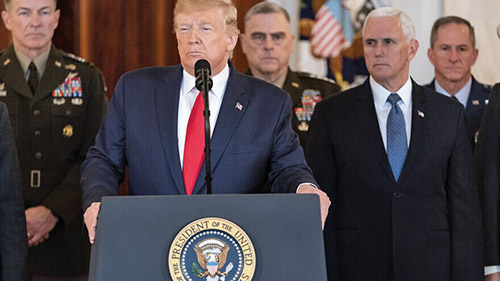
Can the Iran strategy being pursued by the United States and supported by Israel succeed? If so, is the Trump administration’s “maximum pressure” policy politically sustainable?
President Trump’s announcement of his decision to withdraw the United States from the Joint Comprehensive Plan of Action was widely derided by his critics as having blown up the best method yet devised for stopping Iran from getting a nuclear weapon. But his move was based on an accurate analysis that the pact was fatally flawed.
The U.S. Treasury Department’s willingness to enforce or at least threaten to enforce sanctions on any economic entity that did business with Iran and also wished to engage in commerce in the U.S. has had a devastating impact on the Iranian economy. In that context, Trump’s talk of “maximum pressure” against Iran has proven to be more than mere rhetoric.
Iran has attempted to orchestrate responses to the sanctions aimed primarily at scaring Europeans and Americans into thinking that Trump’s policy was setting the region on an inevitable path to war. Though it has been criticized for what has, at times, been described as a weak response to Iran’s provocations, the Trump administration has rightly discerned that Iran’s actions were largely a bluff.
That analysis was confirmed by the killing of Qassem Soleimani. Iran’s limited response illustrated that its talk of war was a feint. Seen from that perspective, “maximum pressure” has been a qualified success.
However, the greater obstacle is whether it is politically sustainable.
Iran’s refusal to talk to the Americans is based on its hope that a Democrat who will return the U.S. to the nuclear deal will replace President Trump in the White House. For Trump, sustaining his strategy regarding Iran will require a political resolution, and that means a second term, as well as the ability to pursue this approach with patience. And given Trump’s disdain for the concept of military involvement in the Middle East, this is not the issue on which he will stake his political future.
While it remains to be seen whether or not a Democratic successor will take advantage of what Trump has achieved and continue pressure against Iran rather than abandoning it next year, the fate of “maximum pressure” will be decided by American voters.
This is a summary of a speech given to the Conference of Presidents of Major Jewish Organizations at their annual conference in Jerusalem on Feb. 17.
To read the full text of the speech, visit https://www.jns.org/opinion/can-trumps-iran-policy-succeed-in-the-long-run/.
Jonathan S. Tobin is editor in chief of JNS—Jewish News Syndicate. Follow him on Twitter at:
@jonathans_tobin.
By Jonathan S. Tobin/JNS.org









